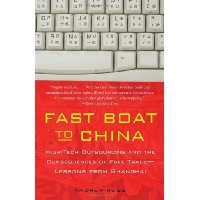| 商家名称 |
信用等级 |
购买信息 |
订购本书 |
|
|
 |
Fast Boat to China: High-Tech Outsourcing and the Consequences of Free Trade: Le |
 |
|
 |
Fast Boat to China: High-Tech Outsourcing and the Consequences of Free Trade: Le |
 |

基本信息·出版社:Vintage
·页码:320 页
·出版日期:2007年06月
·ISBN:1400095549
·International Standard Book Number:1400095549
·条形码:9781400095544
·EAN:9781400095544
·装帧:平装
·正文语种:英语
·丛书名:Vintage
内容简介 Most Americans today are aware that jobs are being outsourced to China, India, and other nations at an alarming rate. From factory jobs to white-collar, high-tech positions, the exporting of labor is one of the most controversial issues in America.
Yet few people know much about the other end — about the people who are actually working these jobs and how their own lives have been throw into tumult by these new economic forces. Andrew Ross spent a year in China, interviewing local employees and their managers in Taiwan, Shanghai, and the far western provinces. In this engaging and informative book, he shows how the Chinese workforce has inherited many of the same worries as American workers, such as job instability, long hours, and awareness of their own expendability. He reports on the daily reality of corporate free trade and explores the growing competition between China and India. This is an eye-opening exploration of an unseen side of our globalized world.
作者简介 Andrew Ross is Professor of American Studies at New York University. He is the author of seven books, including No-Collar: The Humane Workplace and its Hidden Costs, The Celebration Chronicles: Life, Liberty and the Pursuit of Property Value in Disney's New Town and Low Pay, High Profile: The Global Push for Fair Labor. He has also edited six books, including No Sweat: Fashion, Free Trade, and the Rights of Garment Workers, and, most recently, Anti-Americanism. 编辑推荐 “Highly readable. . . . With his clear ideas about fair trade and internationalized labor rights, [Ross] lays out concrete alternatives to the common wisdom that globalization is unstoppable.”
—
Time Out New York“A fresh look at exactly what we should be making of . . . the increasing number of U.S. and European companies that are relocating their factories and work force in China.”
—
The Asian Review of Books“A skeptical take on pro-China boosterism, gained through the same participant-observer techniques the author brought to his
Celebration Chronicles.”
—
The Atlantic Monthly“Engaging. . . . A compelling ground-level perspective.”
—
The Fort Wayne Journal-Gazette 文摘 The Shanghai Squeeze Corporations have been moving jobs and capital out of countries like the United States since the late 1960s. But in the public mind it is only recently that China has become the most likely destination. Almost overnight, it seems, the given wisdom is that if China’s breakneck growth continues, its inexhaustible labor pool, its burgeoning high-tech skills, and its investment opportunities could effortlessly absorb the livelihoods of workers and professionals in every corner of the world. Worries are also mounting about how the world’s resources are being drained to service this growth, but they do not yet compare to the widespread anxiety about the flight of industry and capital: in Mexico, whose NAFTA-based manufacturing sector has been hemhorraging jobs to Asia; in Japan, Taiwan, and Korea, where leading technology industries have come to depend on manufacturing on the mainland; in the United States and Western Europe, where offshore job transfer is sprinting up the value chain into the realm of professional services; in the offshore sites of Eastern Europe and North Africa that are increasingly less profitable than Asian locations; and even
in countries like Cambodia, Thailand, Vietnam, Burma, and India, whose low labor costs are now undercut by the comparative advantages of producing in the heartlands of the jumbo China market.
Workers everywhere tend to perceive the mercurial growth of China’s economy as a threat. Most owners of mobile capital, by contrast, see only an investors’ bonanza. This discrepancy is not surprising, but it is rare to come across a stark divide on such a scale and with so many far-flung consequences. One of the general aims of this book is to explain how these contrasting perceptions came about, whether they are justified, and what conditions are likely to change them. Is China’s growth a timely
……




